
Abstract
Introduction
Mortality rates in cardiogenic shock remain high, especially in patients with SCAI shock stages C to E [1].When hemodynamic status does not improve or worsens despite optimal fluid, inotrope and vasopressor administration, mechanical circulatory support (MCS), most commonly with veno-arterial extracorporeal membrane oxygenation (VA-ECMO) or a microaxial flow pump(MFP), is often used as rescue therapy. Although several observational studies have suggested survival ben-efits with VA-ECMO use in cardiogenic shock [2, 3],these effects have not been confirmed in randomized controlled trials (RCTs) [4–7]. In a meta analysis aggregating individual patient data from 567 patients with acute myocardial infarction related cardiogenic shock(AMICS) from 4 RCTs, there was no significant reduction in 30-day mortality with early use of VA-ECMO (OR0.93; 95% CI 0.66–1.29) [8]. However, in a recent RCT comparing MFP use to usual care in 355 patients with AMICS (DanGer Shock [9]), MFP-treated patients hadlower 180-day all-cause mortality (45.8% versus 58.5%;hazard ratio, 0.74; 95% CI 0.55–0.99; P = 0.04). Does this simply that VA-ECMO should be abandoned [10] and MFPs used for MCS in all patients with AMICS? We are not sure.
